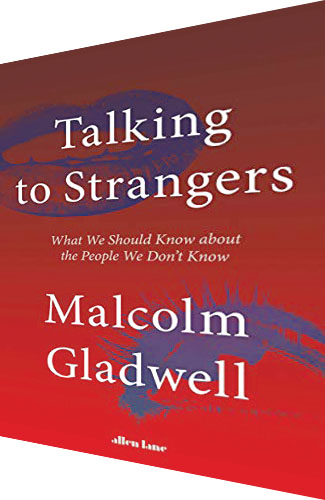 Talking to Strangers – Malcolm Gladwell
Talking to Strangers – Malcolm Gladwell
Allen Lane; Rs.799; Pages 386
How are the world’s greatest liars, frauds and megalomaniacs able to inflict lasting damage upon their societies and the world without highly trained and intelligent experts and watchdogs being able to see through them and stop them in time? That’s the subject of the latest investigation — deftly weaving history, psychology and sociology — conducted by Malcolm Gladwell, features writer of the New Yorker. Since he wrote his first bestseller Tipping Point in 2000, Gladwell has acquired a global reputation with his best-selling non-fiction: Blink (2005), Outliers (2008), What the Dog Saw (2009), David and Goliath (2013) among others. All of them have topped the New York Times bestsellers list and have won him million dollar advances from publishers in the US.
The objective of Gladwell’s latest oeuvre is to demonstrate that when strangers talk to each other, a false word here or there can lead to disastrous consequences, and conversely even when people communicate with familiar individuals they often fail to read their character or malign intent.
Drawing from contemporary newspaper headlines, history, the murky world of espionage and famous legal cases, the author makes the case that even the most well-educated and trained professionals whose job is to detect crime and criminals, fail miserably and default to truth, i.e, give malfeasants the benefit of doubt. And if at all bigtime crooks and swindlers are outed and brought to book, it’s because a contrarian, ‘holy fool’ in Russian folklore — often “a social misfit, eccentric, off-putting and sometimes even crazy” non-establishment outcast — blurts out an inconvenient truth or question. Much like the little boy who said the emperor had no clothes.
To illustrate his contention that the vast majority of people can’t adequately read strangers or even acquaintances, the author draws upon a series of fascinating examples from ancient and 20th century history. In 1519, the Spanish conquistador Hernando Cortes became the first European to hit land in Mexico and met with King Montezuma II, ruler of the Aztec empire, a civilisation far in advance of 16th century Europe. Neither spoke each other’s language and relied on inexpert translators. The upshot was that when the king uttered an honorific for Cortez, it was translated into the former accepting Cortez as a god. And later when Montezuma didn’t accord him the respect due to God, Cortes had him murdered, and war broke out resulting in the devastation of the Aztec civilisation through armed conflict and diseases that unwashed Europeans brought with them. This encounter also flagged off the European conquest of India and Africa and changed the course of world history.
Four centuries later, at a time when the global power of the British empire was threatened by Adolf Hitler and Nazi Germany, prime minister Neville Chamberlain took his first flight abroad to meet with the German dictator. Although there was a mountain of evidence, including his book Mein Kampf in which Hitler had written of his intent to conquer Europe, exterminate Jews, and his need for lebensraum in the vast steppes of Russia for hemmed in German Volk, despite meeting him twice, Chamberlain and his Eton and Oxford-educated foreign minister Lord Halifax, naively accepted the Führer’s assurance that after annexing Sudetanland (the German majority province of Czechoslovakia), the Nazi dictator had no further territorial ambitions. In 1938, Chamberlain returned to London in triumph, waving a sheet of paper he had persuaded Hitler to sign to that effect and famously proclaimed “peace in our time”.
Only one maverick, holy fool whose career in politics seemed to be over, was persistent in his denunciation of the German dictator — Winston Churchill.
A year later when Hitler invaded Poland, the ruling Conservative party ousted Chamberlain and appointed Churchill prime minister. Britain declared war on Germany with fateful consequences for the strutting German dictator. But the question Malcolm Gladwell discusses in considerable detail is how could Chamberlain, Halifax and the entire British establishment fail to read Hitler correctly, despite his patent megalomaniacal intentions?
In this manner the author examines several case histories ranging from the pathetic inability of the US Central Intelligence Agency — projected in the movies as a super-intelligent organisation — to repeatedly fail to detect even careless double agents working within its offices around the world, the failure of multiple government and stock market supervisory agencies to stop Bernie Madoff who ran up a $65 billion Ponzi scam before he was outed; the recklessness of highly experienced Italian judges who wrongly convicted an American college student on holiday in Italy for i murder of her room-mate.
These are some of the headlines grabbing case histories discussed in this engrossing book which investigates why even the most intelligent professionals default to truths staring them in the face. Why do words and plain intent get lost in translation and interpretation? Is this an inevitable human condition?
At the end of the book, Malcolm Gladwell concedes it is the human condition. If everyone is always suspicious of everyone else, all social intercourse and society as we know it, would break down. We have to accept strangers and brothers at face value to get on with our normal lives and leave it to the odd maverick and holy fool to expose liars, thieves and charlatans. Fortunately, although they are a minority, there are enough of them in every society.
Dilip Thakore























